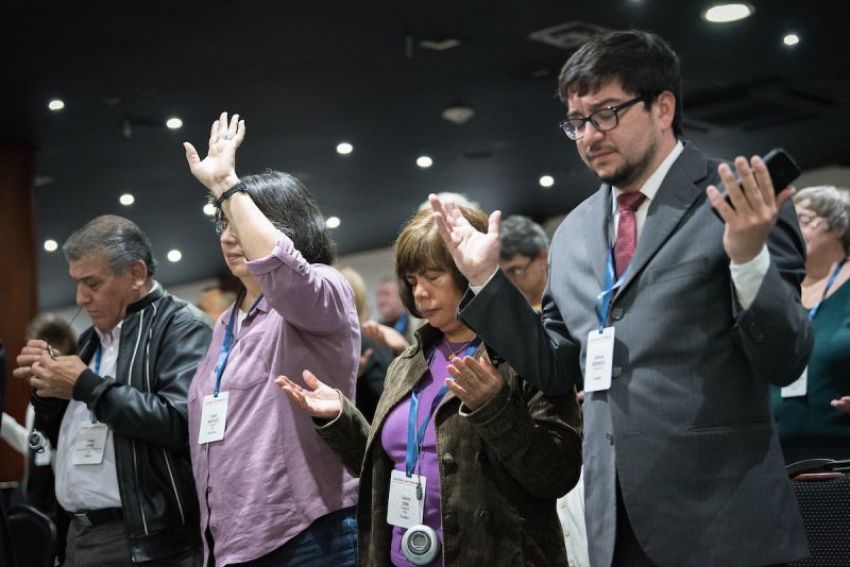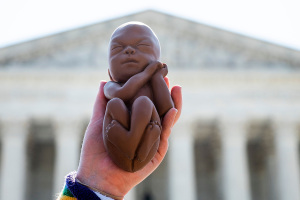What Pentecost is all about and what Pentecostalism offers the postmodern West: theologian

Fifty days after Christ's resurrection, the Holy Spirit was poured out on the day of Pentecost, filling the church in Jerusalem with divine power.
And over 2,000 years later, Christians who call themselves "Pentecostals" have something unique to contribute to the ever-advancing Kingdom, particularly how to do evangelism and apologetics in a postmodern context, says a Christian theologian.
In a Wednesday phone interview with The Christian Post, Martin Mittelstadt, a professor of New Testament who also teaches Pentecostal history and theology at Evangel University in Springfield, Missouri, unpacked the meaning of this pivotal event in church history and what it means for the Church today.
The landing point for the earliest Pentecostals was Acts 2, he explained, as they saw that sharing the Gospel was the central motif, it was about the growth of the Church.
"And the drive for them was evangelism. The goal was to get as many people into the Kingdom in a short period of time," Mittelstadt said, adding "it takes place based upon the disciples not first and foremost being witnesses of the resurrection, but upon their empowerment that takes place on the Day of Pentecost that launches the mission."
Pentecostals, then, will not rely solely on Acts 2 but recognize the ongoing outpouring of the Spirit in the rest of the book. The entire Acts narrative provides the framework for how Pentecostals have historically approached and continue to think about their mission.

"Another thing that early Pentecostals did was bring a very fresh view of 'Who is Jesus?' And so Jesus was not simply someone unique to work on our behalf but Jesus became for us the example of the consummate man of the Spirit," he continued.
"As Jesus is filled with the Spirit, He becomes the one to baptize in the Spirit and so the early church is able to do all that Jesus began to do and teach."
When Christians read the Gospels and the book of Acts they are engaging texts written several decades after the resurrection and ascension of Jesus. The New Testament books, then, provide a look back at what the writers — who have hindsight and things were clearer to them than they were when the events took place — experienced and thought, which have had profound theological implications for ministry.
And though Jesus spoke of what was coming in Acts 2 — telling his followers to wait until they had clothed with power from on high in Luke 24 — the events that took place have always required explanation as they were strange phenomena no one could have predicted, and not necessarily understood. The book of Acts does not give the impression that everyone who was present knew it to be an act of God, Mittelstadt said, noting how Peter got up and had to point out that people who were speaking in other languages were not drunk as it was only 9 in the morning.
When considering at the 20th century Pentecostalism, specifically in North America, the first people who were considered "Pentecostals" were first deemed "apostolic," the Evangel theologian explained.
"In that regard, they were restorationists, what we would say is primitivists. And by primitivists, not meaning simple, but their desire was to return to the era of the first century, to reenact and recapture Book of Acts Christianity."
Those earlier Pentecostal movements tended to sense that something has been lost in the church with the goal being to recapture it and bring renewal. In the 19th century, considerable emphasis was placed on the pursuit of the Baptism of the Holy Spirit, what it ought to look like, the evidence for it, and its purpose, he said.
In the United States, many Pentecostals point to the Azusa Street revival in Southern California, which began in April of 1906.
"But the whole idea of the miraculous and the ongoing work of the Spirit didn't just show up again in the 1900s," Mittelstadt pointed out.
"Pentecostal scholars in the last couple decades have been very much at the forefront emphasizing that these renewal movements have taken place throughout all of church history."
While such movements may have been sporadic and marginalized, the major movement in 20th century, modern day Pentecostalism, was larger and able to endure and thrive in a way that other movements had not. One of the main thrusts from those infillings of the Spirit was evangelism, another was those who encountered the Holy Spirit in this way sought intimacy in God.
"There is no homogenized, early Pentecostalism. There is no way you can say things were uniform," he said.
Pentecost has never simply been the domain of Pentecostals, he stressed, when asked what Christians are missing when they decline to mark this day in church history in a meaningful way.
"I would never want to diminish the emphasis of Pentecost in other traditions," he said.
In fact, within classical Pentecostalism, the dominant tradition has been to not observe Pentecost Sunday on the church calendar since, in some ways, Pentecostalism was a reaction against Roman Catholicism and mainline Protestant churches, seeing church liturgical calendar observations as vestiges of old, dead religion. For Pentecostals, in a sense, every Sunday was Pentecost Sunday. Thus, typical in Pentecostal services was the giving of opportunities for conversion, healing, and receive ministry of the Holy Spirit.
Yet today, Mittelstadt sees a kind of "ancient-future faith movement" burgeoning within Pentecostalism, as Pentecostal denominations — Assemblies of God, Church of God, Church of God in Christ — start returning to the liturgical calendar to frame their faith and community life.
While many traditions have been impacted by the charismatic renewal and the themes Pentecostal Christians have emphasized, Pentecostals are concurrently rediscovering that they have been missing the strengths that more liturgical traditions like Anglicanism have maintained, "that there is something to be said about reenacting the church calendar, reliving the life of Christ every year," Mittelstadt said.
Although many North American believers do not realize it, the Western Christianity is heavily influenced by the Enlightenment, an intellectual and philosophical movement that dominated Europe during the 18th century, a modern project the Evangel professor believes is waning.
"We are fully in a postmodern world and as the Church we have to wake up to that," he said, "postmodernity is here to stay."
In view of this, the way in which we ask questions about the identity of God and where human meaning is ultimately found must be reconsidered, he said.
"The era in which we live in, that even though we see a growing exodus away from the Church [in the global north], that doesn't mean people are less spiritual," he said, referencing the main argument of philosopher Charles Taylor's book, A Secular Age.
"People are not giving up their quest for spiritual truth. It might not be and it often isn't with a Christian worldview. So then the question is: Where has the church failed?"
He added: "Has our angle been wrong? Have we been hammering people over the head in a manner in which a postmodern world will not receive anymore?"
What Pentecostalism can then bring is an experiential encounter with God, he emphasized.
"You've got a world where people are searching for meaning in all kinds of ways. Go to Barnes & Noble and look at the book section. It's no longer simply 'Christian', it's no longer simply 'Religion.' It's 'New Age,' it's 'Diet and Spirituality.' The spirituality is everywhere."
So I don't think we are living in a world that is less interested in the spiritual but it's seeking in a manner that is different than 30-40 years ago.
A method based primarily upon reason and apologetics is increasingly dissipating in favor of one that seeks to answer the question: "How is your living faith, how has your encounter with God something that ought to be meaningful for me?"
Apologetics must be reframed, he reiterated.
"The way we did it in the 1970s and 80s is not going to convince the postmodern [person]. The postmodern is involved in religion a la carte. They are looking at religion everywhere. You're not going to 'defend Christianity' and that's then going to be the reason why they believe," if the case is compelling enough, he said.
Those who do come to faith in Christ will be about authenticity, integrity, meaning and community, he said.
"The idea for an apologetic for the church has been consistent through its history, but it continues to have to be fluid. We have to read the culture."



























